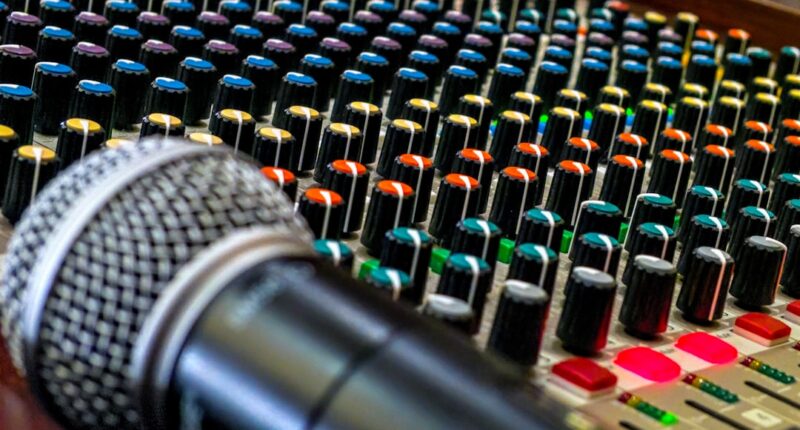A multitude of gifted musicians compete in the music industry, which is a large and cutthroat field. Having the correct contacts can make a huge difference in this crowded field. Herein lies the role of A&R relationships and record deals.
Key Takeaways
- A&R contacts play a crucial role in the music industry by scouting and signing new talent.
- Building a comprehensive music database is essential for finding and connecting with A&R contacts and other industry professionals.
- Developing strong relationships with A&R contacts requires persistence, professionalism, and a willingness to collaborate.
- Crafting a compelling pitch that showcases your unique sound and potential is key to getting noticed by A&R contacts.
- Working with a music manager and leveraging music influencers can help maximize your chances of success in the industry.
Artists & Repertoire, or A&R, is the term used to describe the people who work for record labels and are in charge of finding and signing new artists. These connections can play a key role in an artist’s career launch and record deal acquisition, both of which are essential to the artist’s development and success. Artists and record labels enter into agreements called record deals that specify the parameters of their collaboration. In most cases, a portion of the artist’s earnings are exchanged for the label offering marketing, distribution, financial backing, and other resources. In addition to demonstrating an artist’s ability, record deals allow them to succeed commercially and reach a larger audience.
In the music business, A&R relationships are crucial. They are in charge of identifying and developing talent and assisting musicians in obtaining record deals. A&R specialists are continuously searching for the next big thing and have a good eye for potential. They go to industry events, live performances, and showcases in order to meet new artists and find new talent.
An A&R contact closely collaborates with an artist to develop their sound, image, and overall brand once they see potential in them. They offer insightful criticism and direction, assisting musicians in honing their craft & navigating the intricacies of the music business. A&R relationships are also essential for matching musicians, producers, songwriters, and other collaborators with artists to improve their music. For any artist hoping to establish connections in the industry, building an extensive music database is imperative. It can take some time to conduct research and locate A&R contacts, but the effort is well worth it.
Artists can utilize various approaches to locate A&R contacts and other professionals in the industry:1. Make use of internet resources: Sites like AllMusic, Music Xray, & LinkedIn are excellent places to locate A&R contacts and business people. Artists can use these platforms to look for contacts based on what genre or region they are in. 2.
Go to trade shows: In the music business, networking is essential to forming connections. In order to meet A&R contacts and other industry professionals in person, artists should try to attend conferences, showcases, and music festivals. 3. Performers should look into labels that complement their musical taste and moral principles. Artists can more efficiently focus their efforts by being aware of the rosters of the labels and the A&R contacts connected to them. 4. Seek recommendations: Performers should ask producers, other musicians, and industry insiders for recommendations on A&R contacts and other professionals in the field.
Important introductions can frequently come from personal connections. Building a solid and long-lasting relationship with potential A&R contacts is essential for artists once they’ve been identified. In order to create a positive first impression and a long-lasting relationship, consider the following advice and techniques:1. Be prepared and professional: Artists should conduct themselves professionally when contacting A&R contacts. This entails maintaining a polished online presence, well-written bios, and excellent recordings.
It is important for musicians to be ready to talk about their objectives, inspirations, and musical vision. 2. Customize your approach: Every day, A&R contacts get inundated with emails and messages from artists. Artists that want to stand out should be genuine in their interest in the contact’s work & personalize their approach. Bringing up particular musicians or tunes that you know they enjoy will help build rapport. 3.
Maintain communication and follow up: Developing relationships requires time & work. After first meetings or conversations, artists should get in touch with A&R contacts to show their appreciation & maintain a line of communication. Keeping contacts informed about new albums, TV series, or accomplishments on a regular basis can keep their interest and support. Making a strong pitch is crucial to attracting the attention of A&R contacts.
The following advice can help you make a pitch that is memorable:1. It’s crucial to keep the pitch brief and interesting because the A&R contacts are busy people. Artists ought to present their distinctive selling points in an understandable & appealing way, highlighting things like their accomplishments, influences, and musical style. 2.
In your pitch, artists should provide links to their top songs, music videos, and live performances. This is how you should present your best work. These ought to demonstrate their aptitude, originality, and potential for financial gain. 3. Emphasize your brand & story: Artists can attract A&R contacts with a strong brand and an engaging story. Artists should highlight their background, experiences, & distinctive qualities that make them stand out from other creatives.
The odds of success for an artist can be considerably increased by working with a music manager. Music managers are vital to an artist’s success because they handle a variety of tasks like bookings, contract negotiations, & overall career planning. The following advice will help you locate and collaborate with a music manager:1. Investigate and screen possible managers: Perform a comprehensive investigation on potential managers to make sure they have successfully navigated the industry before accepting them. A manager who is passionate about the artist’s music & who comprehends their vision is crucial. 2.
Clearly state expectations and goals: Artists should discuss their expectations & goals in an honest and open manner with prospective managers. This includes talking about the terms of their partnership, the manager’s duties, and the artist’s creative control. 3. Keep lines of communication open: effective artist-manager relationships depend on open communication.
It is imperative for artists to have open channels of communication with their manager, sharing updates, worries, & any shifts in their career path. Musicians’ careers can be significantly impacted by influencers, who have grown to be influential tastemakers in the current digital era. Someone or a platform with a sizable fan base and sway in the music business is considered a music influencer.
The following techniques can be used to establish rapport with music influencers & take advantage of their platforms to gain visibility:1. Artists should conduct research and identify relevant influencers in the music industry who share a similar aesthetic with their target audience. This comprises social media influencers, YouTubers, playlist curators, and bloggers. 2. Connect with influencers through their content: Artists can interact with influencers’ posts by following, commenting on, and resharing them. This facilitates communication and shows that you genuinely care about their work. 3.
Work together with influencers: Artists can work together with influencers by providing them with performances, interviews, or exclusive content. This could help them gain recognition in the industry and expose their music to a larger audience. Especially for independent artists, navigating the music industry can be daunting. On the other hand, artists can learn a lot about the industry & its workings from a variety of resources.
An overview of some important resources is provided below:1. Publications related to the music business: Pitchfork, Rolling Stone, Billboard, and other magazines and websites offer news, trends, and interviews with industry insiders, among other insightful information. 2. Digital communities and discussion boards: Digital communities & discussion boards, like r/WeAreTheMusicMakers on Reddit, provide a venue for musicians to interact, exchange expertise, and ask other musicians for advice. Three. Workshops and educational initiatives: A large number of establishments and groups provide workshops and educational initiatives especially geared toward future musicians. These courses address a range of topics related to the music business, such as artist management, copyright, and marketing.
Artists can successfully negotiate record deals even though it can be a difficult and intimidating process without proper preparation. The following advice can help you successfully navigate & get ready for record deal negotiations: 1. Know the terms & conditions: Performers should be fully aware of the terms & conditions that are usually included in record deals. Examples of these include ownership of masters, advances, and royalty rates. Artists will be more equipped to bargain for reasonable & advantageous terms with this knowledge. 2. Get legal counsel: Before agreeing to any record deal, artists should definitely get legal counsel.
A skilled entertainment attorney can examine the agreement, clarify its terms, & represent the artist in negotiations. 3. Think about long-term objectives: Performers ought to think about their long-term objectives & how the record deal fits into them. The label’s goals and resources should be evaluated in relation to the artist’s creative and professional goals. To sum up, an artist’s career greatly depends on A&R relationships and record deals. In order for an artist to succeed, they must develop relationships with A&R contacts, write persuasive pitches, & take advantage of industry resources.
Through the implementation of these tactics and ongoing cultivation of industry relationships, musicians can enhance their prospects of landing record deals and realizing their artistic ambitions. Through talent, perseverance, and the right connections, artists can succeed and leave their mark in the difficult and constantly changing music industry.
If you’re looking to expand your knowledge on the music industry, you might find this article on Music Influencer quite interesting. Titled “Hello World,” it provides valuable insights into the world of music influencers and how they can help artists gain exposure and connect with their target audience. This article complements The Ultimate Guide to A&R Contacts: Strategies for Landing Record Deals and Artist Development by offering additional strategies for artists to enhance their career and increase their chances of success. Check it out here!
FAQs
What is A&R?
A&R stands for Artists and Repertoire. It is a department within a record label that is responsible for scouting and signing new talent, as well as overseeing the artistic development of signed artists.
What are A&R contacts?
A&R contacts are the individuals within a record label’s A&R department who are responsible for scouting and signing new talent, as well as overseeing the artistic development of signed artists.
Why are A&R contacts important?
A&R contacts are important because they are the gatekeepers to the music industry. They have the power to sign new artists and help them achieve success in the industry.
How can I find A&R contacts?
There are several ways to find A&R contacts, including attending industry events, networking with industry professionals, and using online resources such as LinkedIn and music industry directories.
What should I include in a pitch to A&R contacts?
A pitch to A&R contacts should include a brief introduction of yourself and your music, as well as any relevant accomplishments or accolades. It should also include links to your music and social media profiles.
What are some strategies for landing a record deal?
Some strategies for landing a record deal include building a strong online presence, networking with industry professionals, and performing live shows to build a fanbase.
What is artist development?
Artist development is the process of helping an artist grow and evolve their sound, image, and overall brand. This can include working with songwriters and producers, developing a marketing strategy, and creating a cohesive visual identity.
Why is artist development important?
Artist development is important because it helps artists reach their full potential and stand out in a crowded industry. It also helps record labels build a strong roster of artists who are poised for long-term success.




